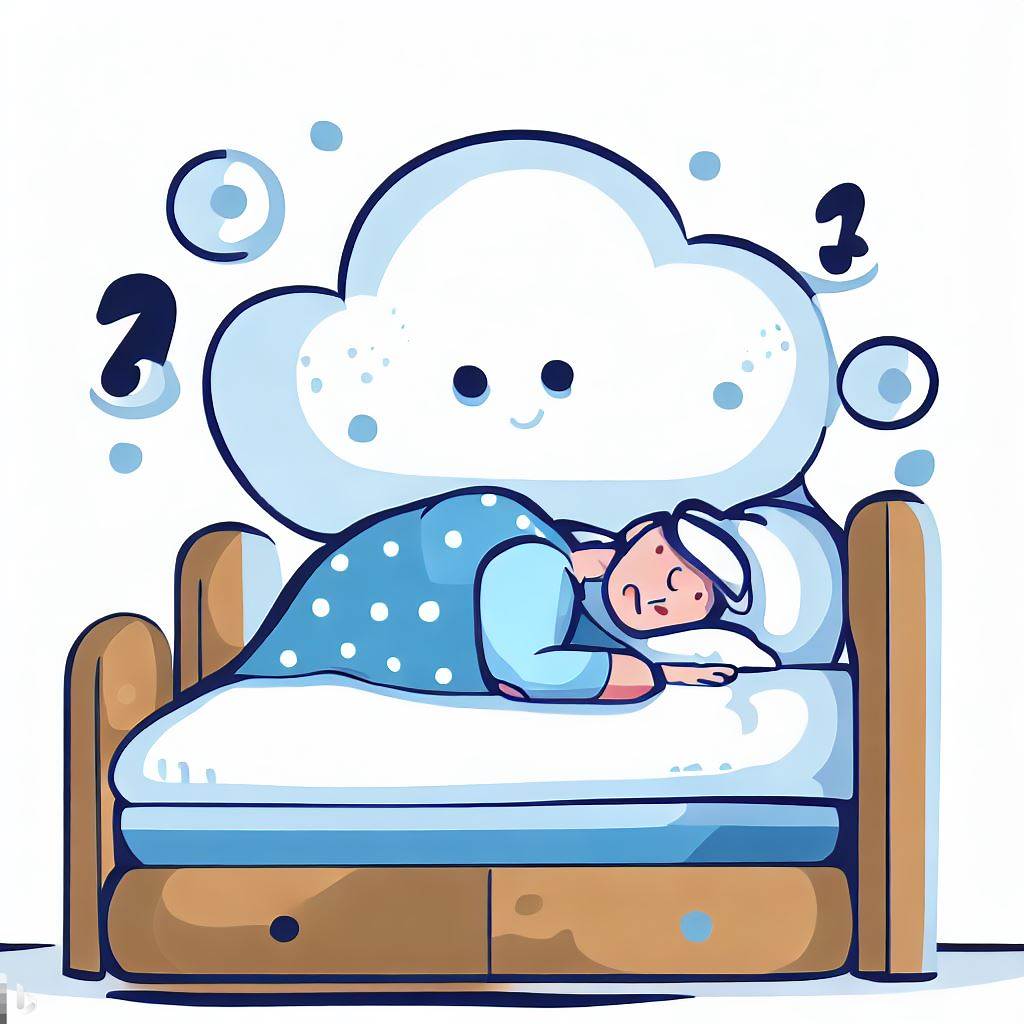Why Do We Forget Dreams So Quickly? The Enigma of Evanescent Dreams

Explore the mysterious realm of dreams as we delve into why we forget dreams so quickly. This article investigates the fascinating science behind the fleeting nature of our nightly reveries, examining cognitive processes, neurochemistry, and sleep patterns. Join us in unraveling the mysteries of our rapidly vanishing dreamscapes.
I. Introduction: Why We Forget Dreams So Quickly
A. The Enigma of Ephemeral Dreamscapes
Dreams are an integral part of our sleep, weaving intricate stories that often vanish from our memories as soon as we awaken. This elusive nature of dreams has puzzled scientists, psychologists, and curious minds for centuries. While some details may linger, most dreams dissipate like a morning mist, leaving us to wonder why they fade so quickly. In this article, we will explore the cognitive, neurochemical, and functional reasons behind the rapid disappearance of our nocturnal narratives and investigate the importance of understanding the underlying mechanisms of dream forgetting.
B. Unraveling the Threads of Dream Disappearance
Understanding why dreams fade so quickly is not only a matter of satisfying our curiosity but also holds potential implications for our overall well-being. Dreams are considered a window into our subconscious, and deciphering their fleeting nature may reveal insights into our emotional and psychological states. Furthermore, uncovering the mechanisms behind dream forgetting can help us improve our dream recall, allowing us to harness the therapeutic potential of our dreams. By delving into the factors contributing to the vanishing of dreams, we embark on a journey to unravel the mysteries of our minds and gain a better understanding of the human psyche.
II. The Stages of Sleep and Dreaming
A. The Dance of REM and NREM Sleep
Sleep is a complex and dynamic process that consists of several stages, including rapid eye movement (REM) and non-rapid eye movement (NREM) sleep. NREM sleep is subdivided into three stages (N1, N2, and N3), with N3 being the deepest sleep stage. REM sleep, often called “dreaming sleep,” is characterized by increased brain activity, rapid eye movements, and temporary muscle paralysis. Interestingly, while REM sleep is most commonly associated with vivid dreams, research has shown that dreaming can also occur during NREM sleep, albeit less frequently and with less vivid content.
B. The Role of Different Sleep Stages in Dreaming
The different sleep stages are crucial in shaping our dream experiences and our ability to remember them. Dreams that occur during REM sleep are often more vivid, complex, and emotional than those during NREM sleep. This difference in dream quality may influence our recall of them upon awakening. Additionally, the timing of our awakenings during the sleep stages also affects dream recall. For example, waking up directly from REM sleep increases the likelihood of remembering a dream, whereas transitioning through the lighter NREM stages before awakening may lead to the swift fading of dream memories.
III. Cognitive Theories Behind Dream Forgetting
A. The Interference Theory: A Tug-of-War of Memories
1. Retroactive Interference
Retroactive interference is a cognitive phenomenon where new information interferes with the recall of previously learned information. In the context of dreams, our daily experiences and newly formed memories may compete with dream memories, causing them to be pushed out of our conscious awareness. As we go about our day, the barrage of new information and sensory experiences may overwrite the fragile memories of our dreams, leading to rapid forgetting.
2. Proactive Interference
Proactive interference, on the other hand, occurs when previously learned information hinders the recall of new information. In terms of dreams, our pre-existing memories and knowledge might obstruct the encoding and consolidation of dream content, making it difficult to remember our dreams once we awaken.
B. The Decay Theory: A Fading Imprint
The decay theory posits that memories fade over time due to the natural process of forgetting. In the case of dreams, the memories may be particularly vulnerable to decay, given their transient and elusive nature. Without a conscious effort to reinforce these memories, the vivid details of our dreams may fade into oblivion as we awaken and shift our attention to the waking world.
C. The Lack of Conscious Attention: Dreams Slipping Through the Cracks
Another reason we forget our dreams quickly may be the lack of conscious attention we pay to them upon awakening. As we transition from sleep to wakefulness, our focus shifts to our immediate surroundings and daily tasks, leaving little room for reflection on our nocturnal adventures. They may slip away without the conscious effort to recall and solidify dream memories, leaving us with only fleeting fragments of our nightly escapades.
IV. Neurochemical Factors Influencing Dream Retention
A. The Symphony of Neurotransmitters
1. Acetylcholine
Neurotransmitters play a pivotal role in forming and recalling memories, including those of our dreams. Acetylcholine, a key neurotransmitter involved in memory and learning, is particularly active during REM sleep. Higher levels of acetylcholine during this stage may facilitate the vividness and complexity of REM dreams. However, the rapid shift in acetylcholine levels upon awakening may hinder our ability to retain these dream memories.
2. Serotonin
Serotonin, another neurotransmitter, regulates mood, appetite, and sleep. Lower serotonin levels during REM sleep may contribute to the emotional intensity of our dreams. However, its role in dream recall still needs to be fully understood, and further research is needed to elucidate the relationship between serotonin and dream retention.
3. Norepinephrine
Norepinephrine, a neurotransmitter involved in stress response and alertness, is virtually absent during REM sleep. This absence may contribute to the amnesia-like state we experience upon awakening, making it difficult to recall the details of our dreams.
B. Hormonal Influences: The Cortisol Connection
Cortisol
Cortisol, the stress hormone, also plays a role in regulating the sleep-wake cycle and memory consolidation. Research has shown that higher cortisol levels may impair memory retrieval, including the recall of dreams. This suggests that fluctuating cortisol levels throughout the night and upon awakening may contribute to the rapid forgetting of our dreams.
V. The Function of Dream Forgetting
A. Adaptive Forgetting: A Blessing in Disguise?
1. The Threat Simulation Theory
According to the threat simulation theory, dreams serve as a rehearsal for real-life dangers, allowing us to practice our responses to potential threats. The rapid forgetting of dreams may be an adaptive mechanism that prevents the confusion of dream scenarios with actual experiences, ensuring we can distinguish between the two and respond appropriately to real-life threats.
2. The Emotional Regulation Theory
The emotional regulation theory posits that dreams help us process and regulate our emotions. Forgetting our dreams quickly might serve a protective function, allowing us to distance ourselves from emotionally charged content and maintain psychological balance.
B. The Role of Forgetting in Memory Consolidation
Memory consolidation, the process of converting short-term memories into long-term storage, occurs during sleep. Forgetting dreams may be an essential part of this process, as it allows our brains to prioritize the encoding and consolidation of more important information from our waking lives. By forgetting most of our dreams, our brains may be making room for the more critical memories contributing to our overall well-being and cognitive functioning.
VI. Improving Dream Recall
A. Mastering the Art of Dream Retention
1. Dream Journaling
Keeping a dream journal is one of the most effective techniques for enhancing dream recall. Immediately upon waking, write down any details or emotions you can remember from your dreams, no matter how incomplete or disconnected they may seem. Over time, this practice can strengthen the neural pathways involved in dream recall and increase the likelihood of retaining more vivid and detailed memories.
2. Rehearsal of Dreams
Rehearsing your dreams upon awakening can also help reinforce dream memories and make them less likely to fade. As you recall the details of your dreams, mentally go over the events and emotions, even if they seem fragmented or disjointed. This mental rehearsal can help consolidate dream memories and improve your ability to recall them later.
3. Proper Sleep Hygiene
Maintaining good sleep hygiene is essential for optimal dream recall. Prioritize getting sufficient and consistent sleep each night, as sleep deprivation can negatively impact memory and cognitive function, including the ability to remember dreams. Establishing a regular sleep schedule, creating a comfortable sleep environment, and minimizing exposure to electronic devices before bedtime can all contribute to improved sleep quality and, in turn, better dream recall.
FAQs
Q: Why do we forget dreams so quickly?
A: Forgetting dreams quickly can be attributed to various factors, including cognitive processes, neurochemical factors, and the natural function of forgetting in memory consolidation. Cognitive theories such as interference, decay, and lack of conscious attention contribute to rapid dream forgetting.
Q: How do sleep stages affect dream recall?
A: The different sleep stages, particularly REM and NREM sleep, play a significant role in the vividness and complexity of our dreams. Dream recall is more likely when we wake up directly from REM sleep while transitioning through lighter NREM stages before awakening may lead to rapid forgetting of dream memories.
Q: What is the role of neurotransmitters in dream retention?
A: Neurotransmitters like acetylcholine, serotonin, and norepinephrine play a crucial role in memory formation and recall, including dreams. Fluctuations in their levels during sleep and upon awakening may contribute to the rapid forgetting of dream memories.
Q: How does cortisol impact dream recall?
A: Higher cortisol levels may impair memory retrieval, including the recall of dreams. Fluctuating cortisol levels throughout the night and upon awakening may contribute to the rapid forgetting of our dreams.
Q: Can forgetting dreams serve an adaptive function?
A: Yes, theories like the threat simulation theory and the emotional regulation theory suggest that rapidly forgetting dreams may be adaptive by preventing confusion between dream scenarios and real-life experiences and allowing us to distance ourselves from emotionally charged dream content.
Q: How can I improve my dream recall?
A: Techniques to enhance dream recall include journaling, mental rehearsal of dreams upon awakening, and maintaining proper sleep hygiene. These practices can help strengthen the neural pathways involved in dream recall and increase the likelihood of retaining more vivid and detailed memories.
Q: What is the role of dream forgetting in memory consolidation?
A: Forgetting dreams may be essential to memory consolidation, as it allows our brains to prioritize encoding and consolidating more important information from our waking lives. By forgetting most of our dreams, our brains may be making room for more critical memories contributing to our overall well-being and cognitive functioning.
Conclusion
A. The Multidimensional Nature of Dream Forgetting
The rapid disappearance of dreams from our memories is a complex and multidimensional phenomenon influenced by cognitive, neurochemical, and functional factors. Understanding the intricate interplay between these factors can help us unravel the mysteries of our vanishing dreamscapes and better understand the human psyche.
B. The Ongoing Quest to Better Understand Our Dreams
The quest to comprehend why we forget dreams so quickly is an ongoing journey that continually reveals new insights into the workings of our minds. As we continue to explore the mysterious world of dreams, we deepen our understanding of the human experience and the untapped potential of our subconscious minds.
Suggested Readings
As we explore the mysterious world of dreams, it’s important to seek additional resources to deepen our understanding of why we quickly forget dreams. By delving into the works of experts in the field, we can expand our knowledge and gain further insights into the fascinating realm of the subconscious mind. Here is a list of suggested readings that can enhance your exploration of this fascinating topic:
- “Dreamscapes Lost: Unraveling the Mystery of Why We Forget Dreams So Quickly” – This engaging book provides a comprehensive examination of the scientific, psychological, and cultural aspects of dream forgetting, offering a unique and well-researched perspective on this elusive phenomenon.
- “Ephemeral Nightscapes: The Neuroscience of Why We Forget Dreams So Quickly” – Dive into the intricate world of neurochemistry, cognitive processes, and sleep stages as this cutting-edge book explores the complex mechanisms behind the rapid disappearance of our dreams.
- “Vanishing Visions: Uncovering the Secrets of Why We Forget Dreams So Quickly” – This thought-provoking book combines personal anecdotes, scientific research, and psychological theories to shed light on the enigmatic nature of dream forgetting and its implications for our daily lives.
- “The Disappearing Dream: A Comprehensive Guide to Understanding Why We Forget Dreams So Quickly” – This accessible and informative book offers practical strategies for improving dream recall while unraveling the mysteries of the human mind and its nocturnal creations.
- “Fleeting Fantasies: Exploring the Adaptive Function of Why We Forget Dreams So Quickly” – Delve into the evolutionary and psychological reasons behind the ephemeral nature of dreams as this captivating book investigates the adaptive functions of dream forgetting in the context of human survival and well-being.
Incorporating these suggested readings into your journey of understanding why we forget dreams so quickly will enrich your comprehension of this intricate subject and encourage further exploration into the fascinating world of dreams and the subconscious mind.






